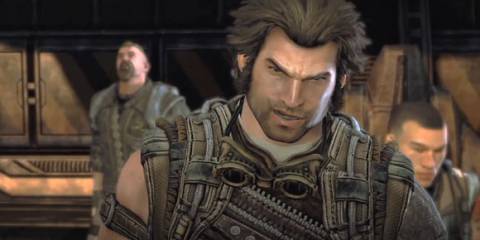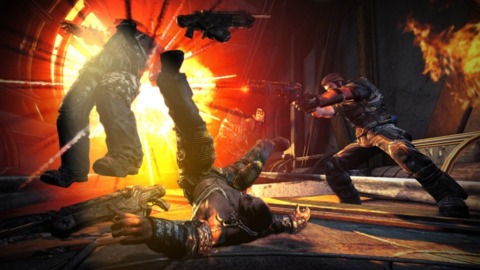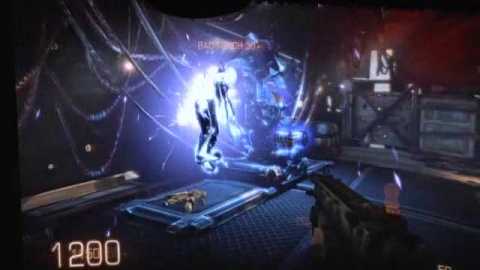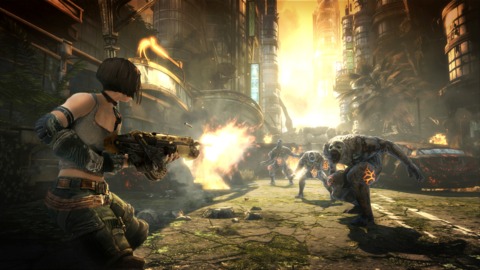
Bulletstorm is the next game from People Can Fly, the people that brought you a gun that shoots both exploding ninja stars and lightning, which should give you a pretty good idea about where their head is at. That gun comes from Painkiller, and you can see some of the studio's past in portions of Bulletstorm. But there's also a distinctly "Hollywood blockbuster" edge to everything, courtesy of Epic Games, which bought the Polish developer back in 2007. In some ways, this game feels like a reaction to Gears of War, which some folks like to slag off as being too gray, too self-serious, and too repetitive. By comparison, Bulletstorm contains a bright, colorful world with a great amount of variety. It's hardly serious, and the way the points system is implemented all but begs you to switch things up as often as possible, which prevents the game from feeling like a one-note affair. Not every aspect of the game hits every single time out, but it's more than solid enough to stand out as something fresh and exciting.
You might not get any of that feeling from the game's opening hour, though, as Bulletstorm starts quite slowly. As Grayson Hunt, leader of an ex-military hit squad that wants revenge against the maniacal general that sent Hunt's team out to kill innocent people, you'll start out with an assault rifle and not much else. The tutorial sequence eventually introduces you to your melee abilities, which include a Sub-Zero-like slide and Duke Nukem big boot, both of which will knock an enemy into the air and slow them down, giving you the opportunity to gun them down while they're floating away. You'll also get an energy leash that can be used to pull enemies in, setting them up for a kick or more gunfire. The leash and your foot are also the main ways you interact with the environment, mainly by leashing things down to fill gaps or kicking objects that are blocking your path.

Of course, all of this would be for nothing if the guns themselves weren't any good. Thankfully, weird future guns with multiple firing modes just happens to be People Can Fly's specialty, and the game delivers with things like the Flail Gun, which shoots out two grenades strapped together with a chain. You can take heads off with the chain itself, or wrap the grenades around enemies or other objects to set up some fun explosions. So, for example, you can wrap a flail around a garbage can, kick it at a group of enemies, and then manually trigger the explosion to take them all out. If you want, you can even wrap up one of your AI-controlled partners and hit the explosion when they're getting swarmed. Then there's the Boneduster, a four-barreled shotgun that will blast enemies in half if you hit them up close. Or the Penetrator, which fires a large, spinning drill bit that carries enemies away when you hit them, nailing them to the wall where the drill spins them around for few seconds. The weapons all also have secondary fire modes, giving you another layer of things to play with, though the secondary fires require their own ammo, rather than draining from your pool of primary ammo. In some cases, this will make you want to make sure those shots count, since they aren't as easy to come by.
The play in Bulletstorm is fast, even though you can slow down individual enemies with a boot or leash. The game keeps up a pretty frenetic pace once you start fighting, though it'll break up the action with quiet spots, giving you time to find a resupply point or exchange some dialogue to advance the story. Considering that you're usually trying to kill enemies in specific ways to score points, you might think that the speed would start to work against it. The game gets around this by making most of the AI fairly basic. Guys with melee weapons rush at you in a pretty straight line. Other enemies will take cover, but they're just as likely to pop out and stand there while you gun them down. The minibosses, which are armed with chainguns or other heavier weaponry, plod around and don't turn very fast, giving you plenty of time to outflank them. This doesn't make Bulletstorm completely simple, but the challenge comes from knowing just how far to push it and just how long to stay out in the open to nail some heavy skillshots before hanging back to let your health recharge. Overall, it feels pretty well-balanced, though I found myself wishing for some kind of sandbox sort of mode with no ammo constraints, just to have more time to play around with the various skillshot techniques. That said, I still managed to complete over 75 percent of the skillshots by the time I made it through the campaign.

The nature of the story is probably what saves it from feeling like it's trying too hard. Over the course the game, Grayson goes from a drunken space pirate to the idiot that realizes he's doomed his entire crew to something approaching respectable. And it's interesting to watch as your partners grow together and grow apart over the course of the story. It's not some huge story with deep fiction and it's not going to spawn any novels, but for a game that's trying to get by on the number of ways which you can kill someone, it's surprising that the story is even cohesive to begin with.
In addition to the campaign, Bulletstorm has a single-player scoreboard-based mode called Echoes, which takes small segments from the campaign and breaks them out into mini-levels. The goal is to finish them quickly while scoring as many points as possible. You'll earn stars and hit an online leaderboard once you're finished. These are pretty good little chunks of action, but it's disappointing that so many of them are ripped right out of the single-player.

The console versions of the game perform as you'd probably expect for a modern Unreal Engine game, but it feels like extra care has gone into giving the game a bright color palette. The environments throughout Bulletstorm are great, with majestic backgrounds and nice lighting both indoors and out. The PC version of the game, as you'd probably expect, is capable of looking much better than the console versions. It's a Games For Windows Live game on PC with its own separate set of achievements and full support for gamepads. With a mouse, you'll probably want to fiddle with the settings a bit, since it feels a little odd out of the box and maps controls in a way that makes perfect sense if you've played it with a gamepad before, but might not be the most intuitive thing for people who never venture off the PC.
After being really down on Bulletstorm for the first couple of hours, I was pleasantly shocked to see how well it started coming together once I started getting better at using the different weapons and once the story started moving at a faster pace. While it's easy to see spots where the game could have been more fully featured or offered more unique areas instead of repurposing campaign spots, it's a solid new entry that truly offers an alternative to the standard sci-fi or military-themed first-person shooter.